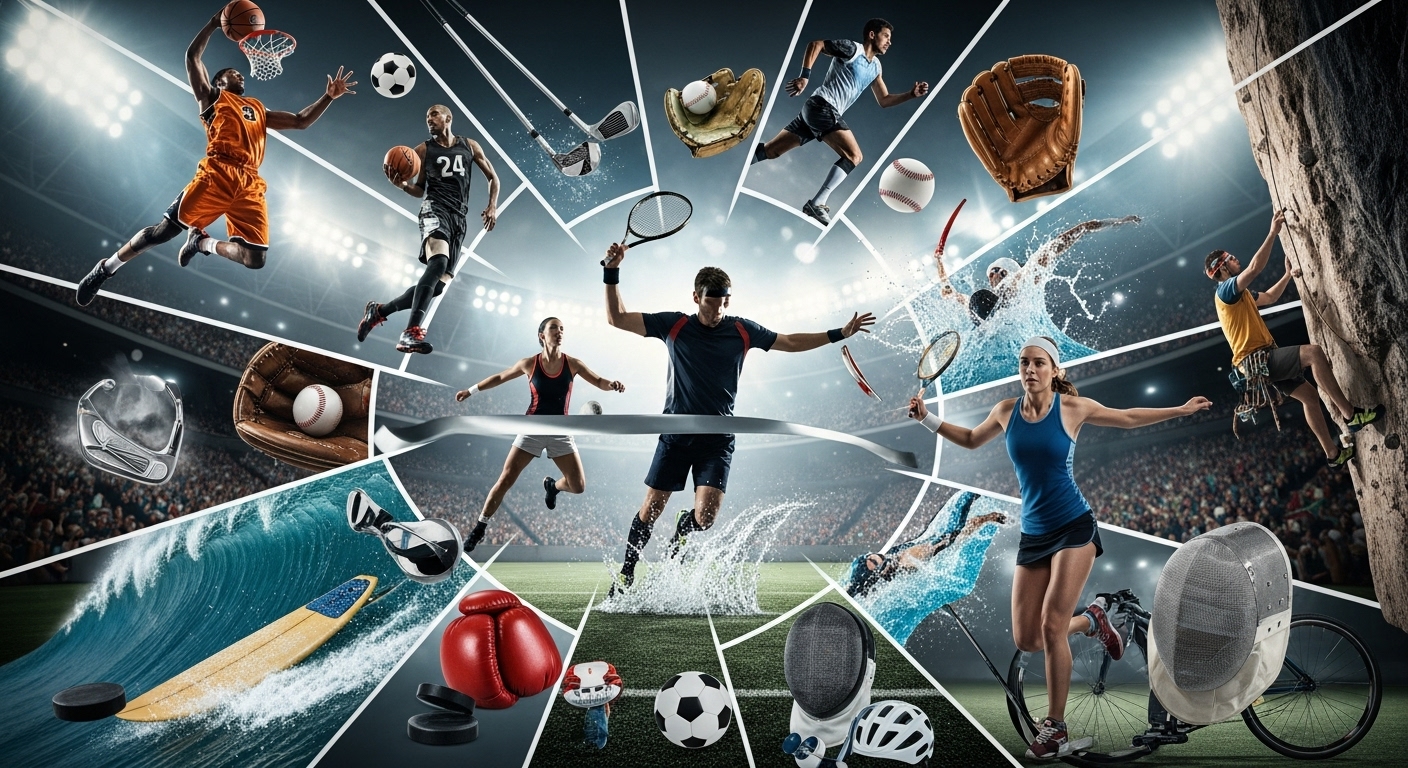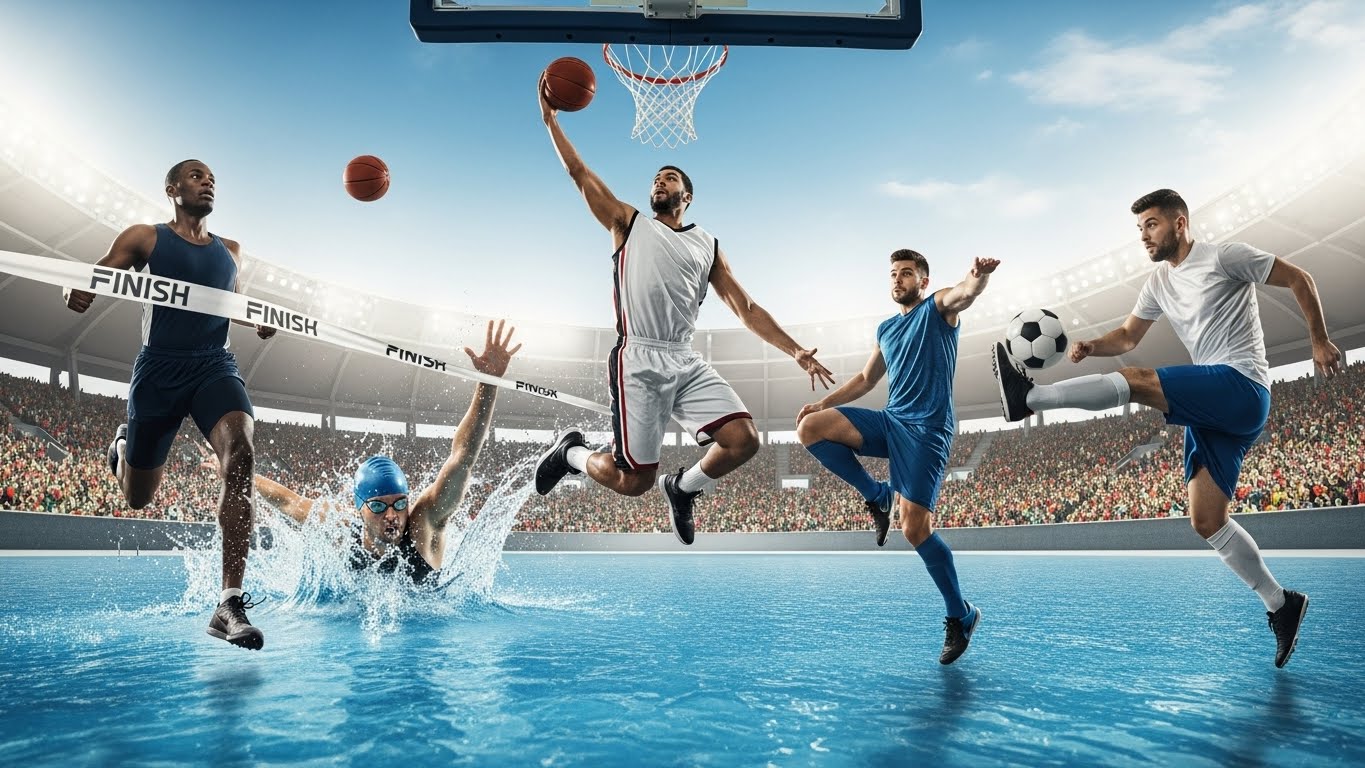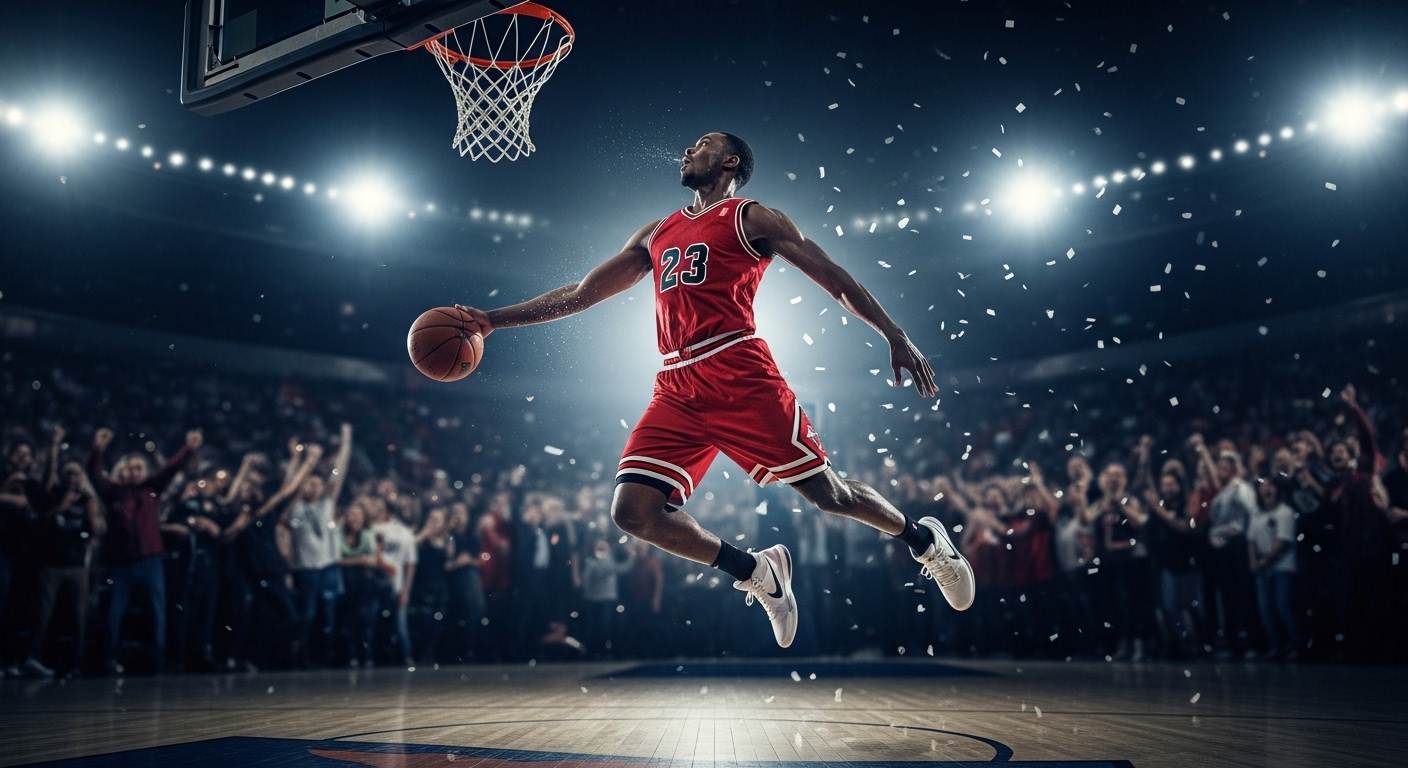Introduction
Sports have always been more than just games. They are a universal language that transcends borders, unites people of different cultures, and ignites the human spirit. From the earliest Olympic Games in ancient Greece to the dazzling stadiums of modern times, sports have evolved into a global phenomenon that influences nearly every aspect of life—health, education, business, entertainment, and even diplomacy.
Whether played professionally or recreationally, sports inspire passion, discipline, and teamwork. They teach lessons of resilience, humility, and perseverance. In today’s fast-paced, technology-driven world, sports remain one of the few activities that bring people together in genuine emotional connection. This blog explores the profound power of sports, their impact on individuals and societies, and why they continue to play such a vital role in human development.
The Origins of Sports
Sports have existed since the dawn of civilization. In ancient times, physical contests were not only a form of entertainment but also a means of preparing for survival and warfare. Running, wrestling, archery, and horseback riding were essential skills for hunters and warriors. These activities evolved into competitive games that tested human strength, endurance, and strategy.
The Greeks formalized athletic competition through the Olympic Games, held in Olympia as early as 776 BC. These events celebrated the human body and spirit, emphasizing honor, discipline, and respect. Similar traditions appeared in other ancient civilizations such as Egypt, China, and the Americas, where athletic activities were intertwined with cultural and religious practices.
Over centuries, as societies advanced, sports evolved into organized disciplines with standardized rules. The 19th and 20th centuries witnessed a massive surge in formal sports organizations, international tournaments, and the rise of professional athletes. Today, sports are one of the world’s most powerful cultural and economic forces.
The Physical Benefits of Sports
At their core, sports promote physical well-being. Regular participation in athletic activities strengthens muscles, improves cardiovascular health, enhances coordination, and boosts overall fitness. Sports also encourage an active lifestyle that counters modern challenges such as obesity and sedentary behavior.
Athletes, both professional and amateur, develop endurance, flexibility, and agility. Engaging in physical sports like swimming, football, or basketball helps maintain a healthy heart rate, build bone density, and improve lung capacity. Moreover, sports can delay aging effects, reduce the risk of chronic diseases, and promote better sleep patterns.
In children and adolescents, sports play a vital role in growth and development. They help improve motor skills, posture, and body awareness. For adults, regular exercise through sports can relieve tension and increase energy levels. For seniors, gentle sports such as golf, tennis, or walking improve balance and mobility, helping maintain independence and longevity.
The Mental Benefits of Sports
Sports are not only a test of physical ability but also a powerful tool for mental health. Participating in sports releases endorphins, chemicals in the brain that reduce stress and promote happiness. This natural boost helps combat depression, anxiety, and emotional fatigue.
Competition and teamwork also cultivate mental toughness. Athletes learn to cope with pressure, setbacks, and failure—skills that are valuable beyond the field. The discipline required for training, maintaining focus, and achieving goals strengthens determination and self-confidence.
Sports also promote mindfulness and concentration. Activities such as archery, running, or yoga require intense focus, which helps individuals disconnect from daily worries. Moreover, being part of a team or club provides social support, reducing feelings of isolation and loneliness.
The Social Power of Sports
Sports bring people together in ways few other activities can. Whether cheering for a national team, joining a neighborhood basketball game, or celebrating a victory, sports create bonds among individuals of different backgrounds.
In local communities, sports promote social inclusion. Youth sports programs keep children engaged, teach respect for others, and offer a safe environment for personal growth. For adults, recreational sports foster friendships, teamwork, and a sense of belonging.
Globally, sports act as a bridge between cultures. Events like the Olympics or the FIFA World Cup unite nations in friendly competition, promoting peace and understanding. Even during political conflicts, sports often serve as a common ground where diplomacy and respect can flourish.
Sports and Character Development
Few activities teach life lessons as effectively as sports. The values embedded in athletics—discipline, respect, integrity, and teamwork—shape character and influence behavior in all aspects of life.
Athletes quickly learn that success requires hard work and dedication. Practice, repetition, and sacrifice are part of every training regimen. Sports also teach humility; no matter how talented someone is, losses are inevitable, and learning from failure is crucial.
Team sports emphasize cooperation, communication, and leadership. Players must rely on one another, make collective decisions, and trust their teammates. Individual sports, on the other hand, develop self-reliance, focus, and responsibility. In both cases, athletes emerge more resilient, adaptable, and emotionally intelligent.
The Role of Sports in Education
Sports play an essential role in educational systems around the world. Schools and universities integrate athletics into their curricula to promote holistic development. Physical education helps students stay active and instills lifelong fitness habits.
Beyond physical health, sports encourage academic success. Studies show that students who participate in athletics often perform better academically. Sports develop time management skills, concentration, and goal-setting—all of which contribute to learning.
Moreover, school sports build community spirit and school pride. Competitions and events unite students, parents, and educators, creating a supportive and vibrant environment. Scholarships and athletic programs also provide opportunities for talented young people to pursue higher education.
The Globalization of Sports
In the modern era, sports have become one of the most powerful global industries. Media coverage, sponsorships, and digital platforms have expanded their reach to every corner of the world. Today, millions tune in to watch events like the Olympics, the Super Bowl, or the World Cup, transforming athletes into international icons.
Globalization has allowed sports to cross cultural and geographical boundaries. A child in Africa can idolize a basketball player from the United States, while a fan in Asia can passionately support a European football club. This interconnectedness fosters cultural exchange and global awareness.
At the same time, sports serve as a tool for economic development. Major events generate jobs, boost tourism, and promote infrastructure growth. Cities that host international tournaments often experience long-term benefits through improved facilities and global exposure.
Sports and Technology
Technology has revolutionized the way sports are played, watched, and managed. From advanced equipment to performance analytics, every aspect of athletics has been enhanced by innovation.
Wearable technology allows athletes to track their heart rates, speed, and performance metrics in real time. Coaches use data analytics to develop training plans, identify weaknesses, and improve strategies. Virtual reality and simulations provide immersive training environments that enhance skill development.
For fans, technology has made sports more accessible than ever. High-definition broadcasts, instant replays, and online streaming allow millions to follow events live. Social media platforms create direct connections between athletes and their supporters, giving fans a more personal experience.
Moreover, technologies like VAR and goal-line systems have improved fairness and accuracy in officiating, ensuring that results reflect true performance.
Women in Sports
The rise of women in sports represents one of the most inspiring chapters in athletic history. For centuries, societal norms limited women’s participation in competitive sports. However, through perseverance and advocacy, female athletes have broken barriers and redefined gender roles.
Today, women compete at the highest levels across nearly all sports, from tennis and soccer to track and boxing. Icons like Serena Williams, Simone Biles, and Megan Rapinoe have not only achieved greatness but have also inspired millions of girls to dream big.
Women’s sports have also gained increasing media coverage and commercial success. The fight for equality in pay, representation, and sponsorship continues, but progress is undeniable. The empowerment of women through sports extends beyond the field—it promotes confidence, leadership, and social change worldwide.
Sports as a Tool for Peace and Diplomacy
Throughout history, sports have often served as a means to promote peace and diplomacy. When political tensions rise, athletic competitions can open channels of communication and foster mutual respect.
Events like the Olympic Games are built on the philosophy of unity and peaceful competition. Countries that might otherwise be divided by politics or ideology come together in celebration of human achievement. Sports diplomacy has played roles in easing tensions, from the famous “ping-pong diplomacy” between the United States and China to modern joint events between nations with strained relations.
At the grassroots level, sports-based peace initiatives bring together youth from conflict regions, using teamwork and play to build understanding and reduce prejudice.
The Business of Sports
Sports have evolved into one of the largest industries in the world. From broadcasting rights and merchandise to sponsorships and endorsements, the business side of sports generates billions of dollars annually.
Athletes today are not only competitors but also global brands. Their influence extends into fashion, media, and social causes. Teams and leagues operate as complex organizations that balance competition with commercial interests.
The rise of esports has further expanded the definition of athletic entertainment, attracting a new generation of fans and investors. The business ecosystem surrounding sports includes marketing, technology, law, and management, creating countless career opportunities beyond the playing field.
The Challenges Facing Modern Sports
Despite its many benefits, the world of sports faces several challenges. Corruption, doping, commercialization, and mental health issues among athletes remain serious concerns.
Doping scandals undermine the integrity of competition, while excessive commercialization risks shifting focus from athletic excellence to profit. The pressure to perform at elite levels can lead to burnout, stress, and even early retirement for many athletes.
Moreover, inequality in funding and access continues to affect developing regions. Not everyone has equal opportunities to train, compete, or reach their full potential. Addressing these issues requires continued commitment from governing bodies, sponsors, and fans to preserve the true spirit of sports.
The Future of Sports
As we look ahead, the future of sports promises to be even more dynamic. Emerging technologies, new forms of competition, and changing social values will continue to shape the landscape.
Artificial intelligence and data science will revolutionize coaching and strategy. Virtual and augmented reality may introduce entirely new ways to train and compete. Esports will continue to grow, merging gaming with athletic performance in the digital age.
Sustainability will also become a priority. Eco-friendly stadiums, carbon-neutral events, and ethical production of sportswear will define the next era of responsible sports management.
Moreover, inclusivity and accessibility will expand, ensuring that people of all genders, abilities, and backgrounds can participate. Adaptive sports for individuals with disabilities are gaining greater recognition, promoting equality and representation.
Conclusion
Sports are a reflection of humanity—our struggles, triumphs, and aspirations. They showcase what the body and mind can achieve when driven by purpose and passion. Whether on a small playground or a grand international stage, sports connect people through shared experiences of joy, disappointment, and perseverance.
The power of sports lies in their ability to unite and inspire. They build character, strengthen communities, and remind us that competition can coexist with friendship and respect. As technology, globalization, and social change continue to reshape the world, sports remain a timeless force for good—a bridge between cultures, a platform for progress, and a celebration of the best in human potential.
From the earliest athletes of ancient civilizations to today’s global superstars, the essence of sports has always been the same: the pursuit of excellence, the spirit of fair play, and the unending quest to push beyond limits. Sports will continue to shape our world, not only through records and trophies but through the values they instill and the unity they create among people everywhere.




